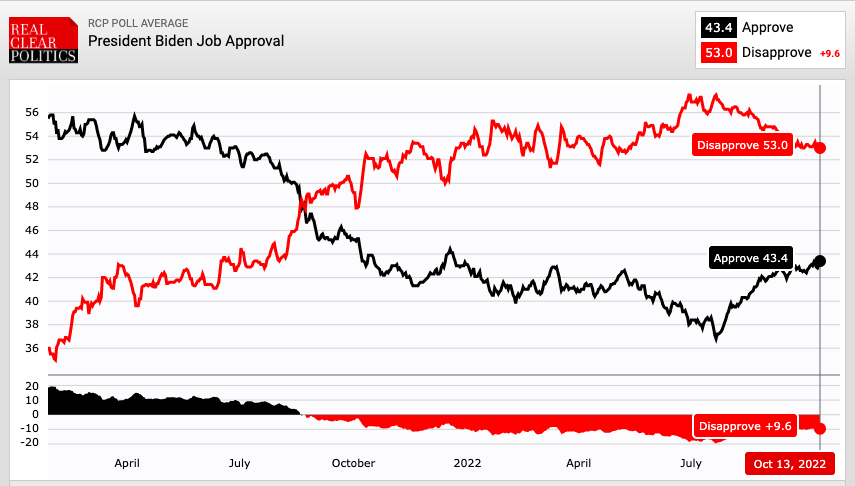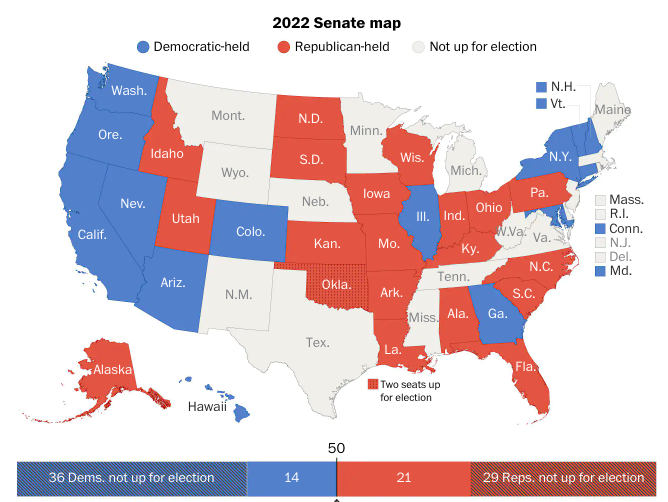US voters will go to the polls in early November for the critical midterm elections that will determine the composition of the next US Congress. In this article, we bring to you all you need to know about this election, particularly its potential outcome and impact.
In the past, voter turnout has been low in the off-presidential election cycle. This year, the vibe is very different as both Republicans and Democrats have strong emotional issues to stir the hearts of their bases to turn out and vote.
As a reminder, every two years, the entire House is up for reelection. The Senate staggers its 100-member elections with 1/3 of them up every two years. Republicans only need to flip 5 seats in the US House of Representatives to take control of it and only 1 seat in the US Senate.
The midterms will have a large impact on US policy across a range of issues from abortion to climate. They also have the potential to impact the 2024 US presidential election depending on their outcome as they are often viewed through the prism of a vote on the ruling administration.
What are the key issues for the voters?
Here are my top five:
- Inflation & Economy
- SCOTUS Abortion Ruling
- Crime
- January 6th
- Climate Change
Historically, voters focus on their wallets to determine which party should get their ballot. Given the 8.2% inflation, and the economy reeling from a wide range of problems, like supply chain disruption and labor shortages, it would’ve been an easy path for Republicans to take control. However, the US Supreme Court Ruling on abortion has changed the political landscape and will likely draw out motivated Democrat voters.
The Battle for the House
Currently, Democrats have a five-seat majority in the House of Representatives. Given the poor state of the economy and the redistricting that has already occurred favoring Republican candidates, the Republicans will likely regain control by taking 20-25 seats. Normally, a sitting president’s popularity helps determine the outcome. Despite President Biden’s recent 10% point improvement, he’s still at -9.6%.

Source: RCP
With this outcome in mind, here’s what I believe will be the agenda for House Republicans.
- Hearings on Afghanistan
- Hearings on COVID origin
- Hearings on transgender athletes
- Hearings on climate change policy and regulations
- Hearings on border control
- Hearings on Hunter Biden
- Bills on promoting energy production
- Bills on making abortion illegal after 15 or 20 weeks
Battle for the Senate
The Senate is a different story as there is no gerrymandering, and candidate quality matters more. Currently, the Senate is split 50-50 with VP Kamala Harris casting the deciding vote. Here’s the current map of Senate races.

Source: WaPo
There are 35 Senate seats up for election in the coming midterms, 21 of which are currently held by Republicans and 14 by Democrats. Out of these 35 seats, 2 are special elections being held to fill the seat of retiring Sen. Jim Inhofe (R-Okla) and the remaining 6 weeks of VP Kamala Harris’ term. The fact that there are 21 Republican seats, but only 14 Democratic seats up for election, makes it more difficult for Republicans to be able to take control of the senate as they have to spend more donations across more races than Democrats.
Despite this, the outcome of the Senate will likely be determined by 10 close races. Here are the races to watch according to Politico:
- Arizona: Mark Kelly (D) vs. Blake Masters (R), POLITICO Election Forecast rating: Lean Democratic. RCP polling average: Kelly +4.1
- Colorado: Michael Bennet (D) vs. Joe O’Dea (R), Election Forecast rating: Lean Democratic, RCP polling average: Bennet +8.3
- Florida: Marco Rubio (R) vs. Val Demings (D), Election Forecast rating: Lean Republican,
RCP polling average: Rubio +4 - Georgia: Raphael Warnock (D) vs. Herschel Walker (R), Election Forecast rating: Toss Up,
RCP polling average: Warnock +3.8 - Nevada: Catherine Cortez Masto (D) vs. Adam Laxalt (R), Election Forecast rating: Toss Up, RCP polling average: Laxalt +2.1
- New Hampshire: Maggie Hassan (D) vs. Don Bolduc, Election Forecast rating: Lean Democratic, RCP polling average: Hassan +6.6
- North Carolina: Ted Budd (R) vs. Cheri Beasley (D), Election Forecast rating: Lean Republican, RCP polling average: Budd +1.5
- Ohio: J.D. Vance (R) vs. Tim Ryan (D), Election Forecast rating: Lean Republican,
RCP polling average: Vance +1.2 - Pennsylvania: Mehmet Oz (R) vs. John Fetterman (D), Election Forecast rating: Toss Up,
RCP polling average: Fetterman +4.3 - Wisconsin: RON JOHNSON (R) vs. Mandela Barnes, Election Forecast rating: Toss Up,
RCP polling average: Johnson +3
Here’s what I think will be the agenda for Republicans should they retake the Senate:
- Continued trade friction with China
- Push for a $1 trillion Defense budget
- Blocking Biden SCOTUS picks
- Boost domestic energy
- Making Trump tax cuts permanent
- Focus on a tighter border
- Review of SEC Climate Disclosure Plan
- Energy production
Should Democrats be able to maintain control of both the House and the Senate, here’s what I predict will be their policy focus:
- Legalizing Abortion
- Potential appointment of Justices of SCOTUS
- Funding of the Ukraine war
- A push for affordable housing
- Climate change regulatory changes
- Social justice issues
- Legalizing cannabis
- SAFE act
Why it matters for 2024
As stated above, midterm elections are generally seen as a referendum on the administration that is in power. Should Republicans take back both the House and the Senate by considerable amounts, President Biden will likely not run for re-election in 2024. But Biden is not the only potential 2024 candidate with a lot at stake in the midterms.
Former President Trump has been extremely active in endorsing non-mainstream candidates in the Republican primaries for both houses of Congress. Should his chosen candidates lose and the Republicans miss the opportunity to take back Congress, this will be a major blow for Trump and will likely diminish his ability to be seen as a leader for both the GOP and the 2024 presidential race.
More than any midterm election in recent memory, the outcome of this election has the potential to linger beyond 2022 and influence U.S. policies well into the future.


